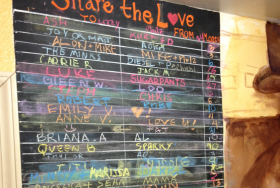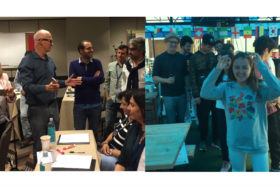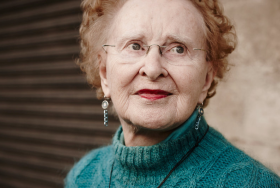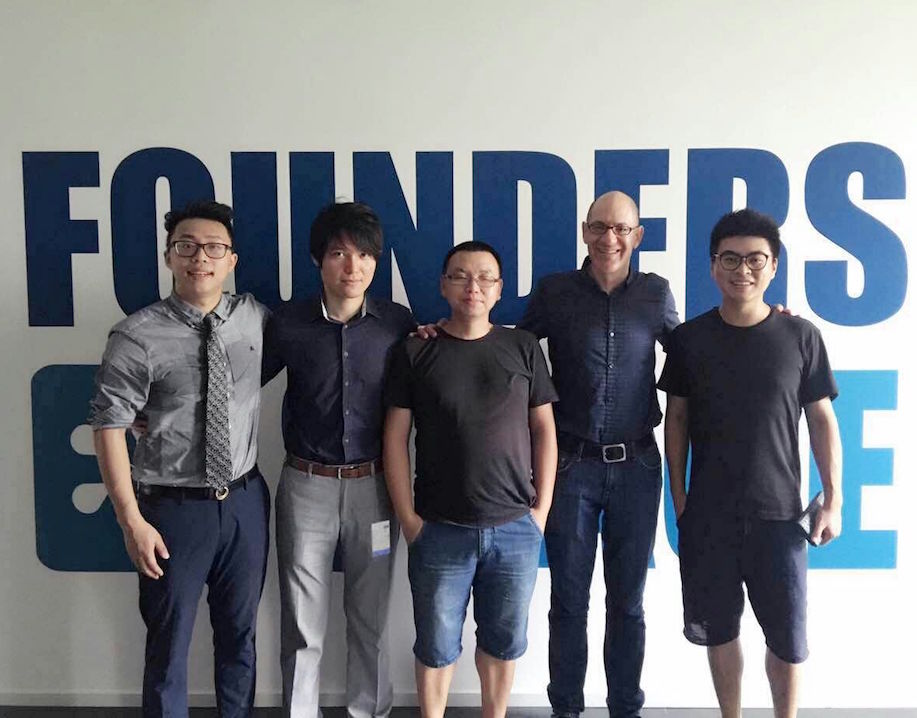
Steve Hoffman’s long, strange, and successful track record includes colorful stints – as a Hollywood development executive in Los Angeles, designer with Sega Enterprises in Tokyo, founder of an interactive television production company and small computer gaming firm, and now, nurturing startups at his San Francisco Founders Space. But if you want to understand where this peripatetic entrepreneur and angel investor sees the future – and his next wave of tech incubators in the works – look beyond the city and Silicon Valley and skip 6,000 miles across the Pacific to Shanghai, Beijing, Shenzhen, and Hangzhou.
The man who considers himself a builder and creator was drawn to San Francisco as a boy. “My mom is an artist, and an interior designer,” Steve told me in the sprawling multi-floor incubator/accelerator that is Founders Space, across from the Caltrain depot on Townsend. “San Francisco represented design and culture.” Growing up in nearby Davis, Steve would accompany his mother on jaunts to the city to soak up art, architecture and design. Dad, in stark contrast, was a professor and nuclear scientist who wanted his son to buckle down and go to engineering school. Young Steve, well, he just wanted to create – shooting 50 short films while in high school.
He earned a BS in electrical engineering from UC Santa Barbara, an MFA in film and television from USC, and then, an entry-level position as a reader with “an old-time Hollywood development executive who had won all these Emmys.” Steve promptly began penning letters to his new boss, telling him he wanted to write TV shows and films. Several months in, he was abruptly promoted “from clerk to head of development.”
He learned quickly that he had to learn quickly. “I didn’t even know what the job was.” In meetings, his boss would ask him what actor to cast in a role. “I didn’t watch TV,” laughs Steve. “I only watched art films.” He began phoning his brother’s best friend, a TV buff, for advice. “Hey, Randy, I have this role in this kind of show. Who should I cast?”
After his wild “Barton Fink” year as head of development, Steve leapt at an offer to develop something new and exciting: games for Sega in Tokyo. That international experience led Steve to co-found LavaMind, where he coded and produced business and financial sim games including Gazillionaire, Zapitalism and other games and apps – along the way fast becoming a serial entrepreneur. After LavaMind, Steve co-founded Spiderdance, a production company that launched one of the first interactive TV shows for MTV, called webRIOT: “the merger of games, Hollywood, and my technical side.”
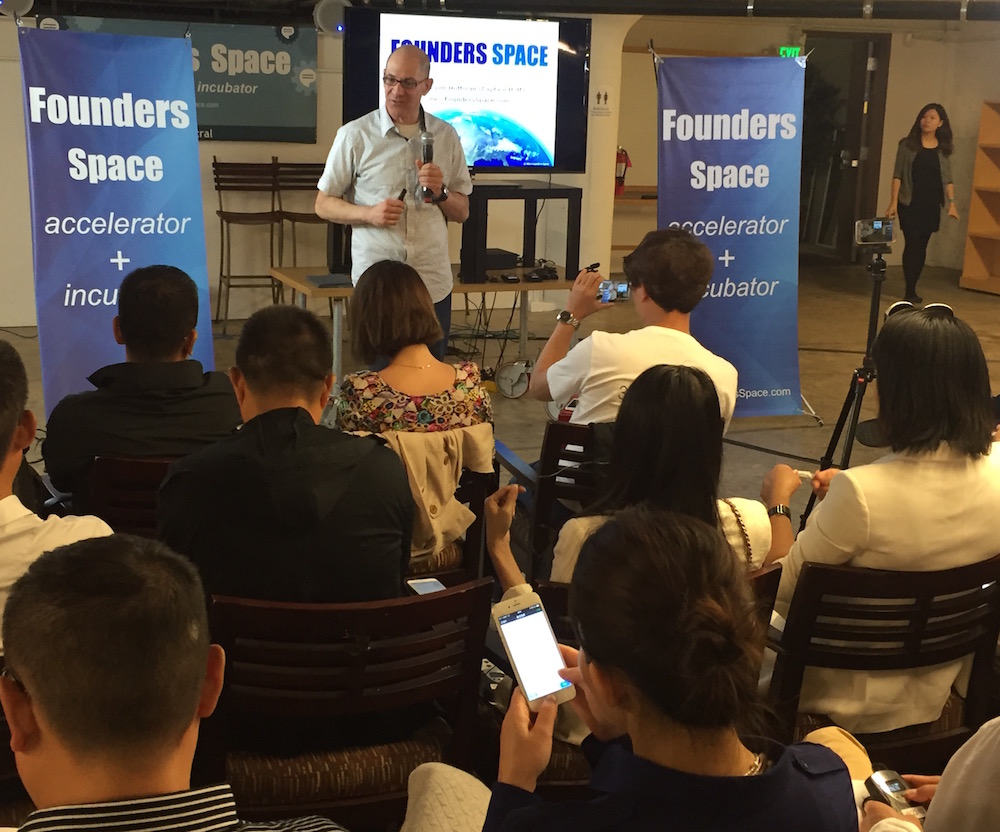
Three startup ventures taught him “the good, the bad, and the ugly.” Entrepreneurs sought out “Captain Hoff” for advice, combing through his “Founders Space” blog to glean tips, and flocking to his “Founders Space Roundtable” meetups, first in San Francisco, then in Silicon Valley, New York, Los Angeles, and Texas. Steve realized SF was the ideal location, and secured the basement at 450 Townsend – right across from the Caltrain hub shuttling tech workers from Palo Alto, Mountain View, and greater Silicon Valley. Two years ago, the Founders Space incubator and accelerator launched, offering training, mentorship, and networking to a handful of startups that quickly grew into several dozen (today it houses around 100 entrepreneurs) and earning praise in Inc. Magazine as a Top 10 incubator.
The China connection began gradually. Steve was invited to speak at local events and invited groups from China to Founders Space. “One person led to another person. I just kept expanding my network and more and more opportunities came up.” Eighteen months ago he made his first trip to Beijing to open discussions for a potential partnership, and now he spends more than 50 percent of his time in China, and is going in “110 percent. ” Shanghai Founders Space opened this summer in the premiere tech park Caohejing with 16,000 square feet of office and event space. (Ironically, we met in Shanghai where we were both speakers at an innovation conference). There are plans to open in Beijing, Shenzhen and Hangzhou.
But Steve is the first to say that “if you’re going to go to China, don’t take every deal that falls into your lap. It pays to be cautious. One thing that counts is brand and reputation. If you have a strong reputation people want to keep you as their friend and partner.” That’s where Founders Space’s San Francisco roots may present an advantage. Founders Space is well known in China, and a number of its well-funded San Francisco startups, such as GrubMarket, are originally from China.
The Chinese principle of guanxi, or relationship building, is key. “It’s more than going out drinking,” says Steve. “How do you build guanxi? I look at how they do business, and find out what types of deals they do. What they are proud of doing. How related they are to other partners. It’s often a puzzle. Working in China can be difficult for foreigners. Just look at Uber.”
The opportunity for Founders Space is large in part because most of the reported 10,000 incubators in China are really little more than co-working spaces: “They just provide space. They don’t provide education, or the relationships or mentoring.”
Today China probably has only 200 true incubators and accelerators, estimates Steve, a relatively small number for the vast size of the country. His plan is to build an East-West collaboration to work together with Chinese partners who know the country much better than he does, and fly in instructors from Silicon Valley to deliver short, intensive sessions for days or weeks. “We contribute by bringing a slice of Silicon Valley thinking and process to the startups in China. We educate them on how to problem-solve, validate markets, raise capital abroad, develop products, and achieve go-to-market on a global scale.”
This San Francisco-China connection may be Founders Space’s greatest edge. Steve is just putting the finishing touches on a book about how startups innovate in Silicon Valley, including what he teaches at Founders Space. “It’s about what China needs to grow,” says Steve “the second half is about the process of radical innovation.”
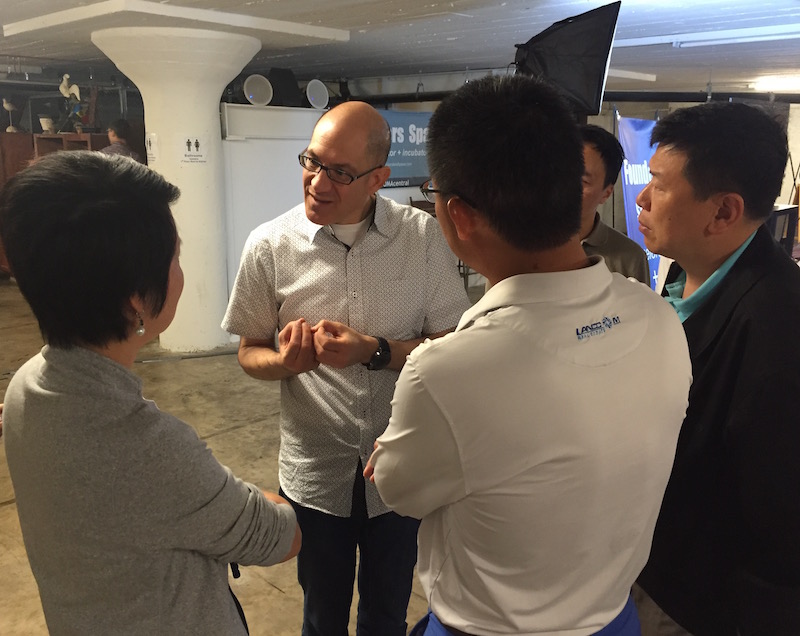
In addition to the traditional American author’s strategy of getting a major New York publisher, Steve landed the top business publisher in China, CITIC Press of Beijing. The book itself is a prime example of his sprint-to-market strategy. He has taken the unusual step of having the pages translated as he writes them, and has prioritized the publication of the Chinese edition, with the announcement that the first copies will be available in China. In Mandarin. In January.
The projects in the works may only be the start. “We also may expand to Chengdu, Wuhan, Qingdao and Dalian,” says Steve. “There’s a lot in the works right now.”
The one-time Hollywood development executive and game designer is going all-in on the global startup board. He’s running fast like the startups and investors that his incubators support. Steve Hoffman is making a very big bet that the East-meets-West connection of China-San Francisco will accelerate and offer big returns – on both sides of the Pacific.
****************************************
Here’s the story in Chinese — 由旧金山大学的王豪盛翻译。
创始人空间(Founders Space)在中国日渐壮大
在史蒂夫 霍夫曼漫长的,独特的成功轨迹中有着很多出彩之处——作为一个在洛杉矶好莱坞的开发主管,在东京世嘉企业的设计师,一个互动电视制作公司的创始人以及一家小型电脑游戏公司的发起者,直到现在,在旧金山的创始人空间(Founders Space)培育初创公司。如果你想要知道这位游走过四方的创业家以及天使投资人在哪里看能看到未来,以及他下一波开办科技孵化器的浪潮会发生的地方?那会是在跨越旧金山和硅谷在太平洋彼岸6000英里外的上海,北京,深圳和杭州。
这位认为自己是一个建设者和创造者的男人很小的时候就来到了旧金山。“我的妈妈是个艺术家,室内设计师。”史蒂夫告诉我穿过火车站在Townsend街上的那个几层楼的复杂构造的孵化器/加速器便是创始人空间。“旧金山是设计和文化的代表。”在戴维斯(旧金山附近的一个城市)长大的史蒂夫以前会经常陪她妈妈来旧金山游览来吸收艺术,建筑和设计的养分。这与他的父亲形成了鲜明的对比,他是一个教授和核能科学家希望自己儿子能去工程师学校学习。年轻的史蒂夫,当然他只是想去创作,他在高中时拍摄了50部短片。
他从UC圣巴巴拉学院获得了电子工程师学士学位,南加大获得了电影和电视的硕士学位,然后获得了一个入门级职位跟着“一位老牌好莱坞公司曾经获得许多艾美奖的开发主管。”入职后的史蒂夫毫不犹豫的不断写信给他的新老板告诉他自己想要创作电视节目和电影。几个月以后他被意外的升职“从普通职员到开发部的头头。”
他很快意识到他必须快速学习。“我甚至不知道我的职责是什么”史蒂夫说道。在会议上,他的老板会问他应该选用那个演员来参演一个角色。“我从不看电视节目,”史蒂夫笑着说。“我只看艺术性的电影。”他开始打电话给他兄弟的好朋友,一个电视迷去问询意见。“嘿!兰迪,我现在有一个角色在这个节目里面,我应该让谁上?”
作为开发部主管的这么一个“巴顿 芬克“一般的一年之后,史蒂夫突然拿到了一个职位邀请去开发一些新鲜的有趣的东西:为在东京的世嘉公司开发游戏。在这个国际化的经历后使得史蒂夫能够成为LavaMind的共同创始人,在那里他编程以及创作关于生意和金融的小游戏包括了Gazillionaire, Zapitalism还有其他游戏和app,通过这段经历让他迅速成为了连续创业家。在LavaMind之后,史蒂夫开办了Spiderdance,一个制作公司,这家公司创作了MTV最早的互动电视节目之一叫做webRiot,“这是一个结合了游戏,好莱坞以及我的科技技能的节目。”
三次冒险创业的经历教会他“好,坏和丑陋“。许多创业者找到“霍夫队长”来征询意见,结合学习他的“创始人空间”博客上分享的文章,或者结伴来到他的“创始人空间的圆桌”聚会。 最开始在旧金山,然后是硅谷,纽约,洛杉矶以及德州。史蒂夫意识到旧金山是一个非常理想的地方,以及保证位于450 Townsend大街的场地作为他的基地--就在对面的加州火车站不断运送着从帕罗门托,山景城和大硅谷地区的科技工作者们来到旧金山。两年前,创始人空间孵化器和加速器正式成立,为创业者提供培训,指导,和为初创公司提供社创业社交网络,迅速的创始人空间的初创公司不断增加(现在有将近100个创业者)而后在Inc杂志中获得了前十的孵化器的奖项。
随着与中国越来越多的紧密联系。一次机缘巧合史蒂夫被邀请去了一个本地的活动并且邀请了一批从中国来的人去了创始人空间。“一个人会让你认识其他的人。我不断的在扩大我的社交网然后越来越多的机会也随之到来。“18个月前史蒂夫第一次有机会去北京展开一次面谈讨关于潜在的合作机会,现在他用自己超过百分之五十的时间在中国,将来会超过“百分之一百一”的时间花在中国。 上海的创始人空间在今年夏天于上海的漕河泾科技园区开业,有着超过1500平方米的场地和活动空间。(有趣的是我和史蒂夫在上海第一次见面是因为我们都被邀请在一个创新论坛活动中作为演讲嘉宾)。史蒂夫计划在北京,深圳和杭州开办创始人空间。
但是史蒂夫是第一个这么说的人“如果你想去中国,不要把所有落到你腿上的机会都揽入环中。你必须要小心。一个很重要的事情是品牌和声誉。如果你有一个很好的声誉人们会想要一直和你做朋友和合作伙伴。” 这就是为什么在旧金山扎根的创始人空间拥有的优势。创始人空间在中国非常出名,以及许多非常成功融资的旧金山初创公司比如GrubMarket其实是从中国发起的。
中国的关系原则或者是建立关系的方式是在中国做生意的关键。“这个含义比一起出去喝酒更多”史蒂夫说“那么你如何建立关系?我会首先观察中国人怎么做生意,然后找到他们做什么样的交易。什么事情是他们自豪的。他们和其他的合伙人的关系。一般这都些事情都像是一个拼图。在中国做生意对于外国人来说是很难的。优步就是一个例子。”
对于创始人空间的机遇是非常大的因为在中国的一万多家孵化器中这些孵化器绝大多数只是比共同工作空间好一点点。“他们只提供场地,他们不提供教育或者关系或者指导。”
今天的中国可能只有200家真正的孵化器和加速器,史蒂夫用了自己计算出的数据,一个非常小的数字在这么大的国家中。他的计划是与中国的合作伙伴们建立一个东方西方在一起的合作机遇,那些合作伙伴对于中国比他自己有更多的认识和了解,然后从硅谷派遣辅导员来提供短暂但是高强度的课程时长几天或者几周。“我们致力于带部分硅谷的思想和做事方式到这些中国的初创公司上。我们教育他们如何解决问题,评估市场,国外融资,开发产品,然后达到能够走向国际化的市场的规模。”这个旧金山与中国的连接可能是创始人空间的最大的优势。史蒂夫正在为他的一本关于初创公司如何在硅谷创新的书进行最后的修改,包括他在创始人空间都教了什么。“这是关于中国成长所需要的东西,”史蒂夫说“ 书的另外一半是关于激进创新的过程。”
另外对于传统的美国作家他们的策略是找到一家大的纽约出版商,而史蒂夫直接找到最棒的中国出版商,北京的中信出版集团。这本书就是一个优秀的例子关于史蒂夫如何冲击市场的策略。他选择了独特的策略当他写完每一页翻译也会同时进行翻译,并且他优先发行中文版,并且发布了声明,这本书的第一版中文版一月份会在中国发行。
这些正在计划和进行的项目只是一个开始。“我们也计划在成都,武汉,青岛和大连进行扩展,”史蒂夫说。“还有很多工作需要做。”
这位曾经的好莱坞开发主管和游戏设计师准备在全球初创公司这张桌子上投下全部筹码。他现在跑的飞快和哪些他的孵化器所帮助的初创公司和投资人一样。史蒂夫 霍夫曼 正在下一个非常大的赌注在在太平洋的两边东方与西方,中国与旧金山的连接会更加密切以及带来更大的回报。
